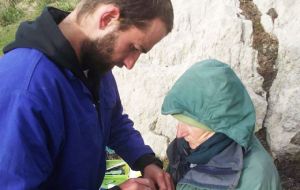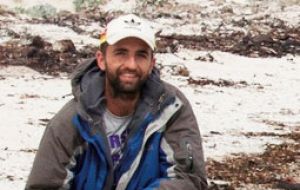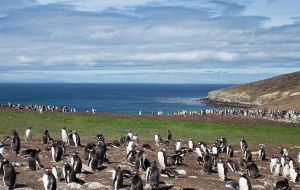MercoPress. South Atlantic News Agency
Falklands' Gentoo penguins practice “kleptoparasitism”, shows study by South African scientist
 South African doctoral student Jonathan Handley (L) attaches a video camera to a Falklands gentoo, assisted by Alicky Davey, working with Falklands Conservation
South African doctoral student Jonathan Handley (L) attaches a video camera to a Falklands gentoo, assisted by Alicky Davey, working with Falklands Conservation  “This is completely new behavior, not just for gentoo penguins but for penguins in general,” said Handley, whose article was published in “Polar Biology”
“This is completely new behavior, not just for gentoo penguins but for penguins in general,” said Handley, whose article was published in “Polar Biology”  There are 130.000 breeding pairs on the Falkland Islands, making it the largest gentoo population on earth.
There are 130.000 breeding pairs on the Falkland Islands, making it the largest gentoo population on earth. Penguins in addition to being stealthy swimmers and keen hunters, unique video footage has revealed a dark side: a video camera attached to the back of a gentoo penguin swimming off the Falkland Islands captures a violent underwater scuffle where penguins steal food right out of each other’s beaks.
“This is completely new behavior, not just for gentoo penguins but for penguins in general,” said Jonathan Handley, a doctoral student in the Marine Apex Predator Research Unit at Nelson Mandela Metropolitan University (NMMU) in Port Elizabeth, whose article on the phenomenon was published in the international journal “Polar Biology” at the end of last year.
In the video, a penguin catches a large squid, clamping it tightly in his beak. Before he can gulp it down, a second penguin snatches the squid away. Then a third joins the scuffle. The first penguin makes a bid for his precious catch, and squid is torn in two. The third penguin is the victor, escaping with the biggest portion.
Video cameras on penguins have revealed their underwater interactions with habitats, prey and other penguins but this is the most dramatic footage yet captured,” said Dr Norman Ratcliffe, a seabird ecologist at British Antarctic Survey in Cambridge.
“Kleptoparasitism (the food-stealing behavior) has been observed in many seabird species (sea gulls, in particular), but these images are unique in that they were captured underwater in a situation that would have been unobservable without this technology. It is interesting that the interaction was over a squid: a large and difficult-to-capture prey item that is clearly worth fighting for … Continued use of this technology will doubtless reveal more about their underwater behavior that will improve our understanding of their foraging ecology.”
Handley studied the Falkland Islands gentoo penguins over three breeding seasons (October to March 2011/2 to 2013/4), in a bid to find out how different colonies across the Islands prosper.
There are 130.000 breeding pairs on the Falkland Islands, making it the largest gentoo population on earth.
“We want to know what factors influence particular sub-populations across the Islands. Because the Falklands is home to the largest global population, this knowledge will help us discover how adaptable these birds might be in the face of global change,” said Handley.
Over the years, Handley has attached various high-tech research devices to the penguins. These have included time depth recorders and GPS devices, to monitor where they swim, how deep they dive, at what temperatures, and for how long, as this provides a better understanding about the animals.
During last year’s breeding season, he was able to acquire eight high definition video cameras, to which he added custom-designed waterproofing that allowed the cameras to function perfectly to a depth of 212m (the deepest dive recorded).
On 20 occasions, the cameras were fitted before a day’s foraging out at sea and removed on the penguins’ return, producing hours of footage – with Handley’s discovery of the underwater scuffle his prize moment.
Handley worked closely with Falklands Conservation, an NGO that runs the Falkland Islands Seabird Monitoring Program, and the scientists at Falkland Fisheries Department. (Reference for Handley’s article in “Polar Biology”: Handley, J. M., & Pistorius) (Source News.co.za)



Top Comments
Disclaimer & comment rules-

-

-

Read all commentsStealing someone else's legitimate property? Must be Argentine penguins.
Feb 26th, 2016 - 07:34 am 0And here I thought that kleptoparasitism was the English spelling of kirchnerismo.
Feb 26th, 2016 - 01:59 pm 0I'm sure it's a misspelling...
Feb 27th, 2016 - 01:06 am 0kelptoparasitism
Commenting for this story is now closed.
If you have a Facebook account, become a fan and comment on our Facebook Page!